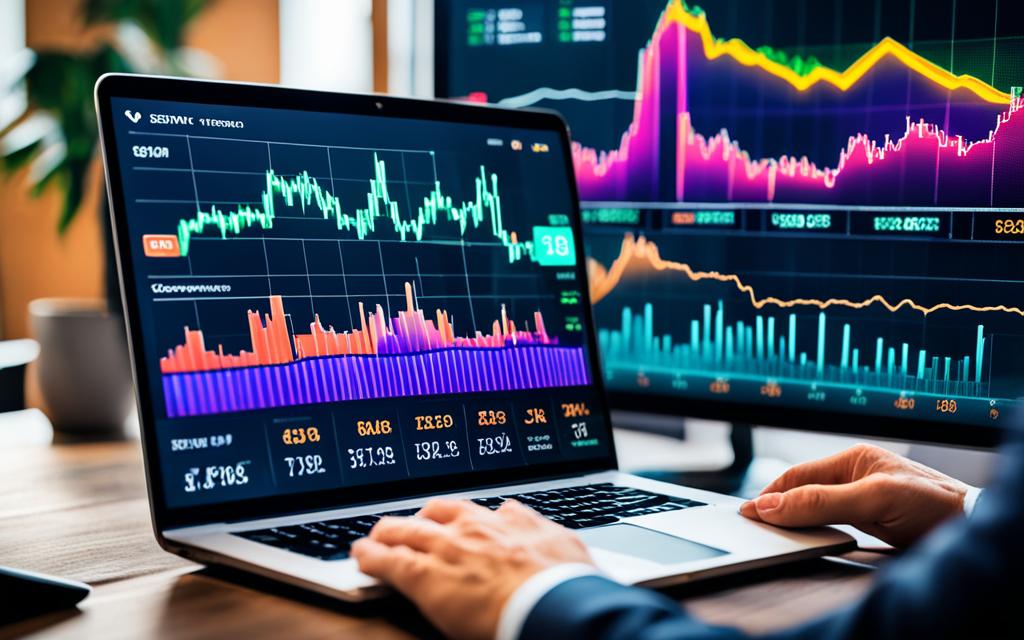Table of Contents
Cryptocurrency markets don’t close, unlike traditional markets. They’re active 24 hours a day, seven days a week. Traders have to change their strategies because of this. It’s important to grasp how nonstop trading affects the market to make the most of it.
Most cryptocurrency trading happens during the week, not on weekends. About 35% of trades go on during Saturdays and Sundays. Yet, the busiest time is from 3-4 PM UTC, according to Skew’s analysis of Coinbase and Binance in 20201. For Coinbase, trading peaks from 10 AM – 11 AM Eastern Standard Time1.
On the big exchanges, the crypto market is always open. But, CFD trading on Axi might have limits. Some assets pause trading on weekends, but not all1. Even so, trading can get lively on weekends. Over 10% price jumps aren’t rare then. This happens due to fewer trades and more big players and regular people joining in1. Just remember, trading costs might be higher over the weekend. But, making trades on major crypto exchanges is still doable1.
Key Takeaways
- Cryptocurrency markets run all the time, unlike stock markets with their fixed hours2.
- Most trading occurs Monday to Friday, but some trading happens on weekends too1.
- Between 3-4 PM UTC is the peak time for crypto trading1.
- There’s a chance for big price jumps on weekends, with extra trading hours1.
- Although it might cost more, trading is still possible on major crypto platforms during weekends1.
The 24/7 Nature of Cryptocurrency Markets
Cryptocurrency spot markets are open all the time. You can buy and sell digital currencies whenever you like. This is unlike traditional markets that are open for certain hours, even on weekends.
This constant access is great for all traders. Whether you work full-time or live in another time zone, you can trade. It lets people make decisions whenever they are ready.
There’s always a chance to react to news. This means traders can take advantage of sudden changes and make smart moves.
The market’s global with people from everywhere. Transactions happen smoothly, no matter the distance or difference in time.
But, this 24/7 rule doesn’t apply to cryptocurrency CFDs. These let you guess the price movements without owning the actual asset.
Global Crypto Market Capitalization
As of now, the world’s crypto market capitalization is at $2.58 trillion3. This shows huge interest in digital assets globally.
The market’s value goes up and down. It peaked at $3 trillion in November 2021 but went down to $2.58 trillion by March 20243. This shows how fast the market can change.
| Cryptocurrency | Price Change Last 7 Days | Price Change Last 24 Hours |
|---|---|---|
| Bitcoin | -4.90%3 | 1.30%3 |
| Ethereum | -10.95%3 | -0.9%3 |
| Tether USD | -0.10%3 | N/A |
| Binance Coin | -0.50%3 | N/A |
| Solana | N/A | N/A |
Bitcoin saw a 4.90% fall but a 1.30% rise in the last week and day3. Ethereum dropped by 10.95% over a week but only -0.9% in 24 hours3. Tether USD saw a small 0.10% decrease3. Binance Coin also went down by 0.50%3. There’s no recent data on Solana’s value3.
These changes show how quickly crypto prices can shift. It’s an exciting yet risky market.
Institutional Interest and the 24/7 Market
Institutions are showing more interest in cryptocurrencies for big returns. They like that they can trade anytime4. This freedom is new compared to regular stock markets.
Improved tools and security are also attracting institutions. They make trading easier and more secure. This helps the market grow and become more stable.
Expect to see more big organisations getting involved. This could lead to better rules and security in the crypto world4.
Customer Support in the 24/7 Cryptocurrency Market
Good customer support is essential in cryptocurrency all hours. Coinbase provides help non-stop by phone and chat for the USA and UK5. They’re always ready to answer your questions5.
You can reach out by email, live chat, or through their site5. They’re there to help with account checks, transaction issues, and more5.
Wait times for help can change depending on how many are asking. But, most users find Coinbase’s support is good5. Quick, useful help makes trading smoother and more enjoyable.
With crypto markets open all the time, you have more chances to trade. Just remember to understand what you’re doing, keep safe, and use reliable support when you need it.
The Best Time to Trade Cryptocurrency
Cryptocurrency markets are open all day and night. Yet, the top time to trade is when markets worldwide are very active.
On average, the most trades happen between 3-4 PM UTC. This is the afternoon in the US when their market opens6.
The most unstable trading time is on Wednesdays at 4 PM UTC. This is also when the US stock market is very active7.
During these busy times, traders can find more opportunities. There are more trades happening, so buying or selling is easier6.
Some experts say it can be good to buy crypto early on a Monday. This is after a quiet weekend of trading. Prices often dip, making Monday mornings a chance to buy low6. Historically, Mondays have been good for making profit, especially around midday ET8.
Nevertheless, the crypto market’s prices can change very fast, anytime. This is why both chances and risks are always there. So, it’s vital to stay updated and think carefully before trading7.
In the end, aim for active trading times, usually in the afternoons. This is when many opportunities are up for grabs6. But remember, the crypto market is highly unpredictable. Being well-informed and cautious is key to success7.
Impact of Global Market Hours on Crypto Trading
Cryptocurrency trading is global, showing different trends based on market hours. For crypto traders, knowing how these hours affect trading is key to making better decisions and earning more.
On weekdays, crypto trading is busiest when the U.S. stock market starts. This happens at the market opening. It shows that most crypto trading happens when all major markets are open, bringing lots of activity and trading chances.
“Bitcoin spot volume tends to peak during U.S. stock market hours, especially at the opening bell.”9
Remember, trading outside busy market hours might be harder. This period could have less trading activity, making it tough to buy or sell big amounts without affecting the market price too much. This situation might increase the cost and risk of trading.
It’s noticed that on weekends, when traditional markets close, the crypto market becomes less volatile. This means the prices don’t change as much. The low volatility on weekends could create a stable market for trading, but there might be fewer trading chances as well.
“Realized volatility in the cryptocurrency market decreases during weekends, reflecting reduced participation from institutional and professional traders.”9
Gas fees for Ethereum also change with trading hours. They’re cheaper on weekends but become more expensive usually during U.S. trading hours. This shows how the global market hours affect the cost of trading9.
“Ethereum gas fees fluctuate depending on network use; transactions are less costly during weekends and more expensive when U.S. trading hours commence.”9
Both centralized and decentralized exchanges see more trading in the U.S. mornings. This matches up with U.S. trading times, showing the impact of global market hours on trading activities around the world9.
“Data suggests that trading activity on both centralized exchanges like Coinbase and Binance, as well as decentralized exchanges like Uniswap, peaks during morning hours in the U.S., aligning with typical U.S. trading schedules.”9
In essence, recognising how global market hours affect crypto trading is very important. It can help traders make better plans, lower risks, and grab more chances to trade. Knowing about busy trading hours and patterns can offer crucial insights into how the market works. This can lead to smarter trading moves and more success in trading.
Trading Crypto on Weekends
Crypto trading is still buzzing during weekends. Traders find chances to trade cryptocurrencies then. Though the trading volume might be lower, big players and regular traders keep markets moving.
On weekends, markets might not be as busy. This means prices between buying and selling can differ more at big exchange places. This happens because fewer people are trading and because of the global market’s time differences.
Weekend Volatility and Market Influences
Weekends show more wild swings in cryptocurrency prices10. Crashes happen more often then, with trades being less. This is because many banks are closed, stopping new investments.
When Asian and American banks open up on Mondays, prices sometimes pop back up. People borrowing money to trade can shake up prices more on weekends. If market activity suddenly drops, traders might sell quickly, affecting the whole market.
Trading Hours and Liquidity
Crypto markets are always open, even on weekends11. But, trading isn’t as busy then, making prices jump around more. This is because there are fewer people trading, so prices can change quickly.
The crypto market doesn’t have set hours, which can be risky. Traders are most active in the evening, Central European Time. This is when most trades happen.
The Role of Liquidity and Trading Opportunities
Having enough available money is key for trading on weekends. Because there’s not as much trading, prices can vary a lot. This can be risky but also offer chances for profit.
Smart traders look for good times to trade on weekends. They keep an eye on the latest news and what big investors are doing. This way, they can find good deals when others are not looking.
Doing well in weekend trading means understanding the market’s moods. It’s also important to know when not to trade because of banking holidays. By staying sharp and knowing the best times to trade, traders can make better profits.
| Most Traded Cryptocurrencies | Trading Hours |
|---|---|
| Bitcoin | 24/7 |
| Ethereum | 24/7 |
| Tether | 24/7 |
| Binance Coin | 24/7 |
| XRP | 24/7 |
The top five are always ready to trade. Bitcoin, Ethereum, Tether, Binance Coin, and XRP are open for trading all day, every day.

Importance of Liquidity and Gas Fees in DeFi Trading
In the decentralized finance (DeFi) world, traders pay close attention to liquidity and gas fees. This is because DeFi trading allows direct transactions with tokens not on usual exchanges. To make the most of this, traders need to know how important liquidity and gas fees are.
Liquidity means how easy or hard it is to buy or sell an asset without changing its price too much. High liquidity is seen in healthy markets with many traders. It ensures smooth buying and selling, keeping market prices stable for traders12.
In the crypto market, a lot of trading makes assets more liquid and the market more stable. When there are more trades, it’s easier to buy and sell without the prices changing too much. Strong assets attract more trading and thus more traders, which means more chances to make deals13.
Several things affect how liquid the crypto market is. For example, setting prices before trading, having small fees, and services to keep trading going smoothly help. These measures make it easier for traders to do business, attracting more to the market13.
Rules on how trading works also help keep the market liquid. When traders trust that the market is fair and rules are clear, they trade more. This boosts market activity, making it easier for everyone to trade13.
A market with good liquidity is harder to manipulate. Big trades don’t move the prices too much. This keeps the market fair and makes trading safer for everyone13.
Besides these benefits, a liquid market gives insights into how people trade, helping others make smarter choices. Market info is more up-to-date and easier to understand in such a market13.
Bitcoin is a good example. Its deep and liquid market makes it tough to manipulate. This is because many people use and trade Bitcoin, making its price fair and reliable13.
New tools are continually being introduced to improve liquidity in the crypto world. Futures markets, like those for Bitcoin and Ethereum, help by adding more places for trading. They let traders bet on the digital currency’s price without owning it13.
Automated Market Makers (AMMs) are crucial in keeping trading moving smoothly on decentralized exchanges (DEXs). They run without a middleman, using smart contracts. This setup ensures there’s always liquidity for trading pairs, improving the DeFi trading experience13.
Liquidity mining, where users get rewards for adding their assets to pools, is getting popular. This trend helps specific tokens or platforms have more trading, benefiting everyone involved13.
Bigger traders and more listings on exchanges also help widen the market. As more big investors join in and new coins get listed, trading opportunities grow for everyone. This boosts market activity and liquidity13.
To make trading better for all, making tools and educational materials available is important. They help traders understand the market better and contribute to its liquidity. This is essential for a good trading experience13.
When it comes to DeFi, gas fees on the Ethereum network are also important. These are fees paid to miners for processing transactions. Because they change based on demand, traders might want to trade at times when fees are lower. This move helps save money and increase profits13.
To sum up, liquidity and gas fees matter a lot in the DeFi world. Knowing how they work, using new technologies, and being smart about when to trade can improve the trading experience. By understanding these key points, traders can do better and explore what DeFi has to offer.
Considerations for Centralized and Decentralized Exchange Activity
When you trade cryptocurrencies, you can choose between two main types of exchanges: centralized and decentralized. Each type has its benefits and downsides. It’s key for traders and investors to know these before they make a decision.
Centralized exchanges are easy to use and are where most people trade. Sites like Coinbase, Binance, and Kraken help you buy and sell. They make sure trading is safe and follow rules to prevent fraud and money laundering14.
The main good thing about them is how they focus on keeping your money safe. They do this by using strong security, giving insurance, and keeping most of the money offline. But, you should always check how safe they really are before you trade15.
But, there’s also another kind called decentralized exchanges (DEXs), such as Uniswap and Pancake Swap. These DEXs let users trade directly using the blockchain and smart contracts. A big advantage is that they keep your info private, because they don’t use regular money or ask for personal details14.
Still, DEXs have their own risks. There are many different cryptocurrencies on them, which could include scams. They might be hard for new traders to figure out at first. Knowing the risks and being careful is very important when trading on DEXs14.
It’s interesting to note that the way people trade on both types of exchanges is quite similar. They both see more action at certain times of the day, especially when it’s the end of the working day or in the morning in the US. This shows that US trading times affect both centralized and decentralized exchanges. Traders can use this info to plan their trades better15.
In conclusion, centralized exchanges are known for being easy to use, safe, and full of options, making them popular. Decentralized exchanges, however, offer more freedom, privacy, and lower fees. It’s all about what matters most to you. By knowing the differences, you can choose the best option for your trading needs.
Impact of Crypto Trading on Institutions
The 24-hour crypto markets don’t rest, unlike traditional business hours16. So, there can be delays when moving money or making trades16. Institutions have to work through these differences, especially when banks and exchanges are closed16. This shows that institutions must be ready for non-stop crypto trading.
The crypto trading field is getting bigger, with big name institutions and companies joining in16. Although crypto markets are smaller than stocks16, they share some similarities. For example, people who trade stocks often join the crypto market because it’s easier to get into16. Some stocks and cryptos are closely linked, like those from the mining and blockchain sectors16.
Institutions must also watch how Bitcoin moves, since it often guides the whole crypto market, much like the S&P 500 does for stocks16. Yet, the relationship between stocks and crypto is not always steady16. It can change because of many things like government rules, world events, and financial policies16.
| Key Statistics | Reference |
|---|---|
| Global cryptocurrency market cap exceeded $1 trillion as of May 2023 | 17 |
| The SEC took 26 cryptocurrency enforcement actions alone in 2023 | 18 |
| The SEC increased its Cyber Unit by 66% in 2022, renaming it the Crypto Assets and Cyber Unit with 50 officials | 18 |
| The SEC has brought dozens of enforcement actions against actors in the crypto space | 18 |
Dealing with the crypto market comes with its own set of risks. The changing value of cryptocurrencies can lead to big losses, seen in the 2022 crash17. There’s also risk from illegal activities like hacking, which have led to large thefts17. Institutions must protect their money and follow rules against money laundering and illegal funding18.
Crypto also brings new challenges, like how much energy it uses, and different rules in each country17. Plus, people can buy things without giving out personal details17. So, institutions need to keep up with crypto, adjust strategies to stay safe, and find ways for smart growth while following laws17.
Conclusion
Cryptocurrency markets are always open, giving traders chances to profit around the clock. Yet, to do well, you need a smart plan. This plan must consider when markets worldwide are most active and how prices change. Knowing when to trade lets you make the most of your strategy and the market’s fluidity.
Different global market times are key in cryptocurrency trading. Each trading session around the world affects how busy the markets are. This also impacts how prices move. Understanding these effects helps you make better choices.
Staying updated on the crypto world is crucial. New technologies, rules, and ways to learn about finance are shaking things up. Africa is in the spotlight for its innovation. As a trader, keeping up with the changes opens doors to new chances.
To sum up, cryptocurrency trading is exciting yet challenging. It requires a solid plan and knowing when to act. With the right approach and staying informed, traders can do well in this fast-paced market.
FAQ
Do cryptocurrency markets close?
Cryptocurrency markets run all day, every day. There’s no stopping them.
What are cryptocurrency spot markets?
They’re places where you can trade digital money and tokens in real-time.
When is the best time to trade cryptocurrency?
Try to trade when markets are buzzing across the globe. This is when many people are buying and selling.
How does global market hours impact crypto trading?
When the US market wakes up, things get busier in crypto trading.
Can you trade cryptocurrency on weekends?
Certainly! You can trade crypto any day. Just know it might be quieter on weekends.
Why are liquidity and gas fees important in DeFi trading?
They affect how much you pay to do transactions and how busy the network is. This matters in DeFi trading.
What are considerations for centralized and decentralized exchange activity?
Trading often picks up early in US mornings and around closing hours.
How does crypto trading impact institutions?
Institutions find it hard to match 24/7 trading with their usual schedules. This is a challenge.
How can traders optimize their trading strategies in cryptocurrency markets?
Keep an eye on worldwide trading hours, how prices move, and the network’s busyness for a successful plan.












